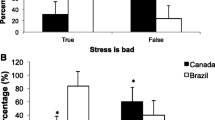Abstract
Nepal suffered a major 7.8 Richter Scale earthquake on April 25, 2015. At the time of the earthquake, 116 young adult Nepalese were studying in Israel. This study examined the effect of a single-session intervention that combined knowledge about stress responses and effective coping with drawing to reduce their stress 4 days after the earthquake. To examine the intervention effect, the SUDS values of the students were measured using a pre-post design. Participants reported high levels of distress at the start of intervention. Their levels of distress significantly decreased on completion of the intervention. Results extend prior findings of the efficacy of an easily implemented intervention for stress reduction among individuals indirectly exposed to disaster conditions.
Similar content being viewed by others
References
Allen, A., Marcelin, L. H., Schmitz, S., Hausmann, V., & Shultz, J. M. (2012). Earthquake impact on Miami Haitian Americans: The role of family/social connectedness. Journal of Loss and Trauma: International Perspectives on Stress & Coping, 17(4), 337–349.
Altindag, A., Ozen, S., & Sir, A. (2005). One-year follow-up study of posttraumatic stress disorder among earthquake survivors in Turkey. Communications in Psychopharmacology, 46, 328–333.
Arnberg, F. K., Hultman, C. M., Michel, P., & Lundin, T. (2012). Social support moderates posttraumatic stress and general distress after disaster. Journal of Traumatic Stress, 25, 721–727.
Başoglu, M., Salcioglu, E., & Livanou, M. (2002). Traumatic stress responses in earthquake survivors in Turkey. Journal of Traumatic Stress, 15(4), 269–276.
Başoglu, M., Salcioglu, E., & Livanou, M. (2007). A randomized controlled study of single-session behavioural treatment of earthquake-related post-traumatic stress disorder using an earthquake simulator. Psychological Medicine, 37(2), 203–213.
Findley, P., Isralowitz, R., & Reznik, A. (2014). Emergency preparedness and intervention: Social work education needs in Israel. Journal of Emergency Management, 3, 229–235.
Huss, E., Sarid, O., & Cwikel, J. (2010). Using art as a self regulating tool in a war situation: A model for social workers. Health and Social Work, 35, 201–209.
Isralowitz, R., & Findley, P. (2009). Emergency preparedness and vulnerable populations: Lessons learned for education and training. Journal of Emergency Management, 7(6), 29–34.
Khachadourian, V., Armenian, H. K., Demirchyan, A., & Goenjian, A. (2015). Loss and psychosocial factors as determinants of quality of life in a cohort of earthquake survivors. Health and Quality of Life Outcomes, 13, doi:10.1186/s12955-015-0209-5.
Kuwabara, H., Shioiri, T., Toyabe, S., Kawamura, T., Koizumi, M., Ito-Sawamura, M., et al. (2008). Factors impacting on psychological distress and recovery after the 2004 Niigata–Chuetsu earthquake, Japan: Community-based study. Psychiatry and Clinical Neurosciences, 62, 503–507.
Livanou, M., Kasvikis, Y., Başoğlu, M., Mytskidou, P., Sotiropoulou, V., Spanea, E., et al. (2005). Earthquake-related psychological distress and associated factors 4 years after the Parnitha earthquake in Greece. European Psychiatry, 20, 137–144.
Lopes, A. P., Macedo, T. F., Coutinho, E. S., Figueira, I., & Ventura, P. R. (2014). Systematic review of the efficacy of cognitive-behavior therapy related treatments for victims of natural disasters: A worldwide problem. PLoS ONE, 9(10), e109013. doi:10.1371/journal.pone.0109013.
Messiah, A., Acuna, J. M., Castro, G., Rodríguez de la Vegab, P., Vaivaa, G., Shultz, J., et al. (2015). Mental health impact of the 2010 Haiti earthquake on the Miami Haitian population: A random-sample survey. Disaster Health, 2, 1–8.
Oflaz, F., Hatipoglu, S., & Aydin, H. (2008). Effectiveness of psychoeducation intervention on post-traumatic stress disorder and coping styles of earthquake survivors. Journal of Clinical Nursing, 17, 677–687.
Sarid, O., & Huss, E. (2011). Image formation and image transformation. The Arts in Psychotherapy, 38, 252–255.
Shultz, J. M., Besser, A., Kelly, F., Allen, A., Schmitz, S., Hausmann, V., et al. (2012). Psychological consequences of indirect exposure to disaster due to the Haiti earthquake. Prehospital and Disaster Medicine, 27(4), 1–10.
Spittlehouse, J. K., Joyce, P. R., Vierck, E., Schluter, P. J., & Pearson, J. F. (2014). Ongoing adverse mental health impact of the earthquake sequence in Christchurch, New Zealand. The Australian and New Zealand Journal of Psychiatry, 48(8), 756–763.
Wolpe, J. (1969). The practice of behavior therapy. New York: Pergamon Press.
Zhang, L., Zhao, Q., Luo, Z., Lei, Y., Wang, Y., & Wang, P. (2015). Prevalence and risk factors of posttraumatic stress disorder among survivors five years after the “Wenchuan” earthquake in China. Health and Quality of Life Outcomes, 13. doi:10.1186/s12955-015-0247-z.
Author information
Authors and Affiliations
Corresponding author
Rights and permissions
About this article
Cite this article
Segal-Engelchin, D., Sarid, O. Brief Intervention Effectiveness on Stress among Nepalese People Indirectly Exposed to the Nepal Earthquake. Int J Ment Health Addiction 14, 1–5 (2016). https://doi.org/10.1007/s11469-015-9623-5
Published:
Issue Date:
DOI: https://doi.org/10.1007/s11469-015-9623-5




